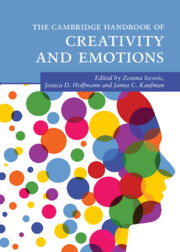Book contents
- The Cambridge Handbook of Creativity and Emotions
- Cambridge Handbooks in Psychology
- The Cambridge Handbook of Creativity and Emotions
- Copyright page
- Dedications
- Contents
- Figures
- Tables
- Contributors
- Acknowledgments
- Creativity and Emotions
- Part I Methods in the Study of Creativity and Emotions
- 1 Experimental Methods in the Study of Emotions and Creativity
- 2 Affect, Complexity, and the Case Study Method
- 3 Observational Methods in the Study of Creativity and Emotions
- 4 Assessing Creativity and Affect in Everyday Environments
- Part II The Development of Creativity
- Part III Emotions and the Creative Person
- Part IV Emotions and Creative Products
- Part V Emotions and Creativity at School and Work
- Index
- References
3 - Observational Methods in the Study of Creativity and Emotions
from Part I - Methods in the Study of Creativity and Emotions
Published online by Cambridge University Press: 16 February 2023
- The Cambridge Handbook of Creativity and Emotions
- Cambridge Handbooks in Psychology
- The Cambridge Handbook of Creativity and Emotions
- Copyright page
- Dedications
- Contents
- Figures
- Tables
- Contributors
- Acknowledgments
- Creativity and Emotions
- Part I Methods in the Study of Creativity and Emotions
- 1 Experimental Methods in the Study of Emotions and Creativity
- 2 Affect, Complexity, and the Case Study Method
- 3 Observational Methods in the Study of Creativity and Emotions
- 4 Assessing Creativity and Affect in Everyday Environments
- Part II The Development of Creativity
- Part III Emotions and the Creative Person
- Part IV Emotions and Creative Products
- Part V Emotions and Creativity at School and Work
- Index
- References
Summary
Emotions and creativity are seemingly ubiquitous in our everyday lives. If so, why aren’t observational methods used to study them more frequently? This chapter first provides a brief history of observation science and differentiates between quantitative and naturalistic observations. Four observation challenges are outlined. Tips for planning, designing and implementing observation studies of creativity and emotions include clarifying definitions creativity and emotion that can be adequately operationalized for the purposes of observation, connecting the theoretical framework to the observation method of choice, developing observation protocols, clarifying the observer role and addressing validity, reliability and principles of generalizability and transferability. Observation protocols are described for studying theatrical performance (quantitative), creative engagement in science-based instruction (mixed methods) and empathy development in leaders’ creative problem solving using improvisational theatre (qualitative). The conclusion discusses the importance of the contribution of observation to the continued growth of the field of creativity studies and emotion research
- Type
- Chapter
- Information
- The Cambridge Handbook of Creativity and Emotions , pp. 47 - 67Publisher: Cambridge University PressPrint publication year: 2023

